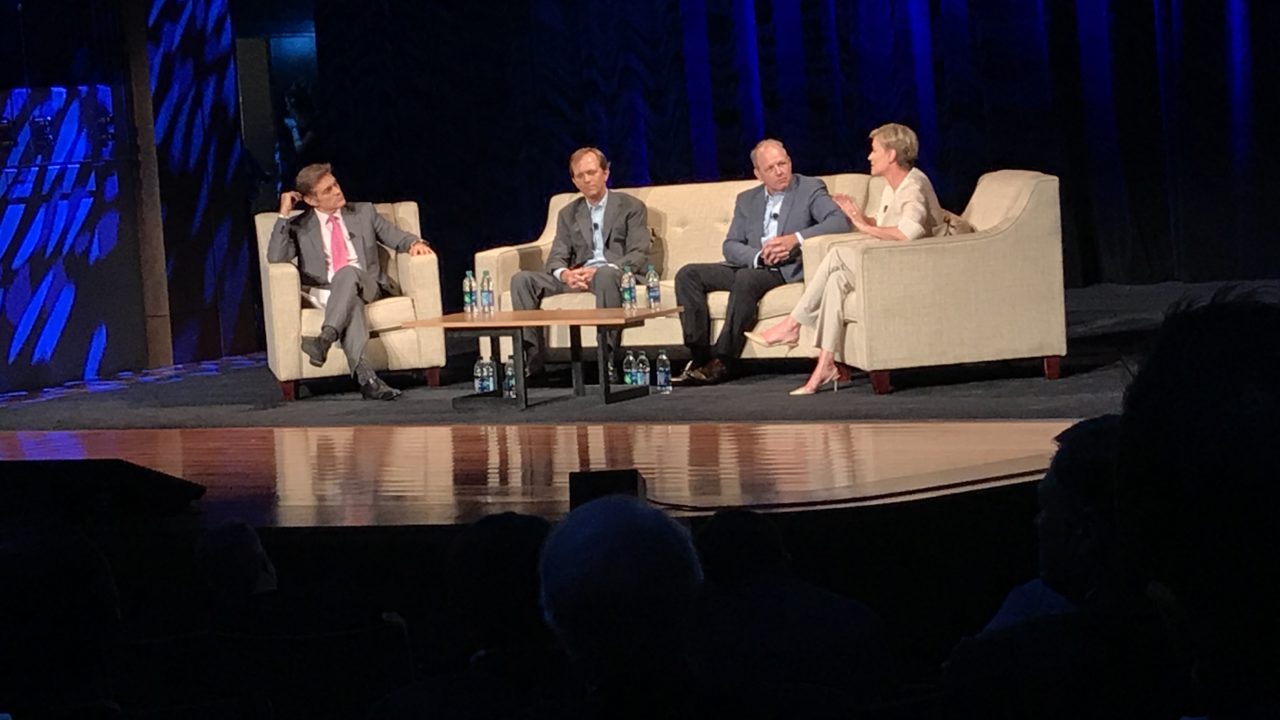By Kara Sherrer
“A mayor, an NBA Hall of Famer, and the founder of CrossFit walk into a bar” is the start of a joke. “A mayor, an NBA Hall of Famer, and the founder of CrossFit walk onto a stage” is the start of the Health:Further 2017 conference.
The conference kicked off Tuesday afternoon with a slate of panels that required a premium ticket to attend. And no wonder: The afternoon line-up featured plenty of heavy hitters, including Nashville Mayor Megan Barry, NBA Hall of Famer Dominique Wilkins, and the founder of CrossFit, Greg Glassman.
We breakdown the first day of the conference below:
Theme(s) of the day
The first half-day focused on inspiration and drawing lessons from outside industries, including consumer products (Procter & Gamble), sports (Atlanta Hawks), hospitality (Forbes Travel Guide), virtual reality (HTC Vibe) and more. Speakers drew parallels between health care and their respective industries, explaining how to apply (for example) best practices for positive guest experiences in hotels to improve patient experiences in hospitals.
Power players
Today featured a slate packed full of big experts and companies. Major names included Craig Wynett, Chief Creative Officer of Procter & Gamble; Steve Koonin, CEO of the Atlanta Hawks; Ryan Ellis, defenseman for the Nashville Predators; and Kat Kinsman, Senior Food & Drinks Editor at Time Inc. Surgeon and television personality Mehmet Oz, better known as Dr. Oz of The Dr. Oz Show, participated in several panels. His company ShareCare, co-founded with WebMD founder Jeff Arnold, is a major sponsor of Health:Further.
Key takeaways
Dr. Oz made a remark early in the afternoon that encapsulated one of the major problems facing health care today: “People do not change based on what they know. They change based on how they feel.” People know that they shouldn’t drink that soda or eat that donut, but it feels good, so they do anyway. In order to inspire people to become healthier, technology must make the choice feel good (or at least less painful). On the physician side of technology, Vinay Narayan gave concrete examples of how virtual reality headsets could be used to train future surgeons — for instance, being able to place trainees inside the human body virtually to see how it works. This technology could open up more ways to train future doctors and help address the coming provider shortage.
Connections to Vanderbilt
John Ingram (MBA ’96) spoke as part of a panel about “Leveraging Change to Create Opportunity,” reflecting on his long history in the publishing industry and how he has weathered its significant disruptions. Larry Van Horn, Associate Professor of Economics and Management at the Owen Graduate School of Management, delivered both the opening and closing remarks of the day. Van Horn is one of Health:Further’s organizers as well as co-founder and director of the Center for Health Care Market Innovation at Owen, a co-sponsor of Health:Further.
Can’t get over it
Glassman offered up plenty of memorable quotes and anecdotes. He believes that the CrossFit movement developed organically — “I’m more of a superintendent of a natural resource. This movement grew spontaneously” — and described its methodology as a “profound and elegant metabolic truth.” He noted that CrossFit’s compelling mixture of physical agony and social camaraderie “almost seems like a variant of the Stockholm syndrome.” He gave Steve Koonin a hard time about his work for Coca-Cola many years ago, since soda contributes to diabetes and other health problems due to the high sugar content. While nearly everyone else stuck to more formal scripts, Glassman brought a raw and sometimes biting edge to his panels. He’s slated to give a solo talk Wednesday afternoon, so check back for more memorable Glassman quotes.
